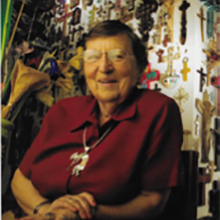
Mentor, teacher, trainer, pioneer, traveler, advocate – these are just a few of the words used to describe Arlene K. Schindler. Her professional life journey took her from the inner city of Detroit, Michigan to 137 countries around the world. And during a career that spanned 50 years, she touched lives and supported others in their quest to harness the power of volunteerism in their communities.
In the early days of her career, with two undergraduate degrees and a PhD in psychology of learning, Schindler worked in the inner-city schools of Detroit as a teacher and administrator. In 1968, the Peace Corps asked her travel to Africa to set up a fledgling teacher-training program. This was an eye-opening experience that changed her life. Returning to the US, she settled in the Washington, D.C. area and looked for the next challenge that would utilize her love of learning and teaching. She applied and was accepted for the position of training director at what was then the National Center for Voluntary Action (NCVA).
Along with delivering training on Volunteer Management for NCVA, Schindler accepted an opportunity to start volunteer bureaus or volunteer centers across the country. One of the major roles of these centers was to assist people interested in connecting to a local volunteer opportunity. Out of early conversations with colleagues came the novel idea of developing family volunteer programs – opportunities where families could volunteer together. Supported by a Kellogg Foundation grant and inspiration from NCVA colleagues, Schindler started the first such program in a Montana nursing home. Thus began a lasting trend that has endured into the 21st century.
During the 1980s, Schindler held professional positions with Women in Community Service, Prison Fellowship and Special Olympics. Her work took her across the country and around the world. While each organization worked with a different population, the common thread was a focus on volunteering. By the early 1990s, Arlene had connected with George Soros and his Open Society Institute (OSI) – created to support foundations in Central and Eastern Europe and the former Soviet Union. Fifteen cities were identified for volunteer center development, and Schindler spent five years working with each city to develop its own volunteering infrastructure. This period really cemented her reputation for working internationally.
Her deep work with multiple cultures also led her to believe that the Western idea of volunteering had become too organized. The structure and processes of volunteer program management mirrored human resource business practices – with a reliance on forms, procedures, legalities and the like. She worried that volunteer creativity and spontaneity may be stifled under the strict structure then being utilized by many programs.
Perhaps this explains why Schindler’s most enjoyable work came from working with “people of promise” around the globe. Often, they would find their way to her home in Sun City, Arizona, where she ran an informal “host program” for individuals she had met in her travels. Visitors from Poland, South Africa, Romania, Mongolia, Kazakhstan and other countries visited with local programs and people during the day – and met around Schindler’s kitchen table in the evening. They talked about the most significant thing they learned during the day and what ideas could work in their own country and community. The focus was on the possibilities, not a prescribed format or structure. “These people of promise will take what they learn back to their homes where the spirit of volunteerism burns brightly,” Schindler once said. “When they go back armed with new ideas and information, you see immediate growth – from nothing to something extraordinary.”
(Bio Source: Article in Volunteer Management magazine, published by AVA in 2005)
In Arlene’s words:
“Volunteerism is its own little community. You can speak the language of volunteerism anywhere in the world. You can find colleagues, common ground and activities to improve society anywhere. It is a totally unifying concept.”
“We are in a world-changing field. Volunteers make the difference, and we are privileged to participate with them.”
“I had the pleasure of attending a Philosophy Of Volunteering workshop that Arlene delivered in the UK in the 1990s… It completely transformed my perspective on our field. I am here in the profession 30 years later in large part due to Arlene’s wisdom."
-Rob Jackson, Rob Jackson Consulting Ltd, United Kingdom